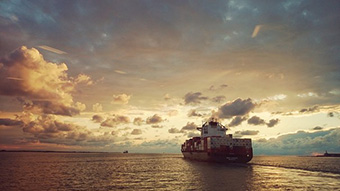The EU-funded LNG PITCH4 project is developing and testing a new liquefied natural gas (LNG) tank for seagoing vessels, to help the shipping industry reduce dependence on heavy fuel oil and reduce pollution.
- 03 July 2019
We see LNG as a transitional fuel for shipping. It is much cleaner than heavy fuel oil, but it remains a fossil fuel whose stocks can run out. Hydrogen is an alternative, although it has its own challenges. But thanks to the upgrade of our lab, we can handle it.
In an effort to become more efficient and sustainable, the shipping industry is changing to cleaner fuel options. Although the ultimate goal is to switch to clean energy such as hydrogen, a lack of technology means doing so is still some years away. In the meantime, many shipping companies are turning to LNG which, although a fossil fuel of finite availability, is a much cleaner alternative to heavy fuel oil.
Although LNG is generally regarded as a clean-burning fuel that produces relatively low carbon dioxide emissions, it contains harmful methane gas. Thus, the key to developing a low-carbon LNG industry is to reduce the methane emissions associated with the production, transportation, and liquefication of natural gas.
The project is developing and testing innovative LNG tanks for the safe and economic large-scale (by sea) and small-scale (by river, road, rail) transport of liquid methane. Specifically, the project is investigating the thermal behaviour of extremely low-temperature, or cryogenic, tanks for the maritime sector.
The Multiphase Wavelab
The key outcome of the LNG PITCH4 project is the Multiphase Wavelab. Located at the Maritime Research Institute (MARIN) in Wageningen, Netherlands. The wavelab testing ground is available to companies, academia, and other relevant stakeholders for experimental LNG applications.
Currently, local SMEs from the east Netherlands are using the lab to test an innovative, medium-sized cryogenic LNG fuel tank for use on board ships. As part of this research, a prototype of the new cryogenic tank is placed in the wavelab, where it is exposed to varying environmental conditions, such as pressure and temperature. Work is being done on a new monitoring system for measuring the loading and deformation of LNG cargo tanks on ships.
In addition to the use of the wavelab, companies have access to the results of the entire process, and to the network of partner universities and large companies. The testing ground offers prospects for research and innovation for liquid hydrogen as a clean, compact energy carrier for transportation.
A local and global impact
With LNG producing 20 % less CO2 than oil, not to mention virtually no sulphur oxides or particulate matter, efforts such as the LNG PITCH4 project are playing a big part in combating climate change. Another benefit is an immediate improvement in the air quality of the east Netherlands region.
Video
Multiwave LabTotal investment and EU funding
Total investment for the project “LNG PITCH4” is EUR 1 006 115, with the EU’s European Regional Development Fund contributing EUR 91 202 through the “East Netherlands” Operational Programme for the 2014-2020 programming period. The investment falls under the priority “Shift towards a low-carbon economy”.

